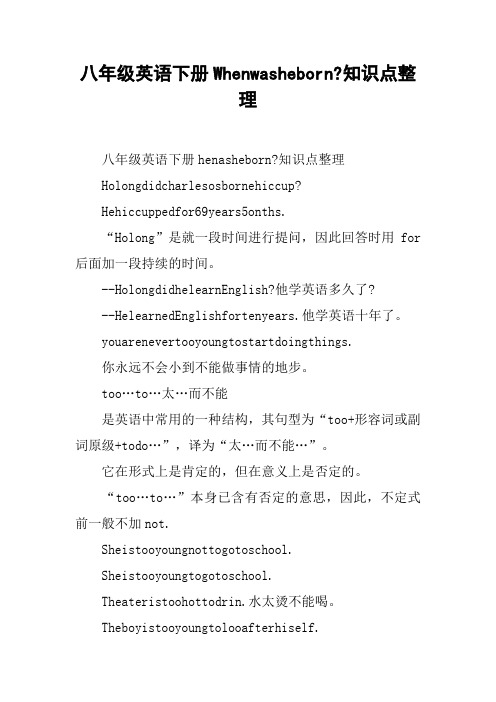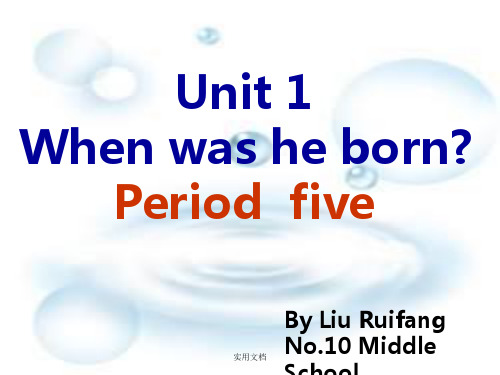第一单元总结when was he born
- 格式:doc
- 大小:41.00 KB
- 文档页数:1


八年级英语上册《hen as he brn》重要知识点汇总八年级英语上册《henashebrn》重要知识点汇总【应把握的词组】1ping-pngplaer乒乓球运动员2agreathineseping-pngplaer中国杰出的乒乓球运动员3starthiupping开始打嗝4t…t…太……而不……riteusi谱写曲子6aviestar电影明星7learntrideabile学骑自行车8startlearningEnglish开始学英语9beginplaingsprts开始体育运动0alvinggrandfather慈爱的祖父1spendallne'sfreetieithsb与某人一路度过了所有的业余时刻2afausvilinist闻名的小提琴手3iesating滑冰4aindandlvinggrandther和善而慈爱的祖母asatinghapin滑冰冠军6thefaushinesepianist中国闻名的钢琴演奏家7asallb(girl)孩提时期8attheagef…在……年龄时9taepartin参加、加入20begintlearntheardin开始学习手风琴21arin主修,专修22startfraplae=leavefraplae起身去…23beausef因为、由于【应把握的句子】1henashebrn?他是何时诞生的?2h'sthat?That'sDengapingSheisagreathineseping-png plaer 那是谁?是邓亚萍。
她是中国一名杰出的乒乓球运动员。
3Hlngdidharlessbrnehiup?Hehiuppedfr69earsnths 查里斯˙奥斯本打嗝打了多长时刻?他打了69年零个月。
4uarenevertungtstartdingthings你永久可不能小到不能做情形的境界。
Tigerdsstartedglfinghenheasnltennthsld泰戈伍德在只有10个月大的时候开始玩高尔夫球。

八年级英语下册Whenwasheborn?知识点整理八年级英语下册henasheborn?知识点整理Holongdidcharlesosbornehiccup?Hehiccuppedfor69years5onths.“Holong”是就一段时间进行提问,因此回答时用for 后面加一段持续的时间。
--HolongdidhelearnEnglish?他学英语多久了?--HelearnedEnglishfortenyears.他学英语十年了。
youarenevertooyoungtostartdoingthings.你永远不会小到不能做事情的地步。
too…to…太…而不能是英语中常用的一种结构,其句型为“too+形容词或副词原级+todo…”,译为“太…而不能…”。
它在形式上是肯定的,但在意义上是否定的。
“too…to…”本身已含有否定的意思,因此,不定式前一般不加not.Sheistooyoungnottogotoschool.Sheistooyoungtogotoschool.Theateristoohottodrin.水太烫不能喝。
Theboyistooyoungtolooafterhiself.这个男孩太小了,还不能自己照顾自己。
Thishouseistoobigtocleaninoneday.这幢房子太大了,一天内打扫不完。
Sheistooyoungtogotoschool.她太小不能去上学。
Theoldenstartedsinging/tosing.老人们开始唱歌。
estarteddoingourhoeorat7o’cloclastnight.我们昨晚7点开始写作业。
Tigeroodsstartedgolfinghenheasonlytenonthsold.泰戈伍德在只有10个月大的时候开始玩高尔夫球。
henheasasallboy,hecouldhusongsanddifficultpiecesofu sic.在他还是一个小孩子的时候,他就能哼唱歌曲和难的乐曲。

基础知识分类整理及考点典型例句精讲精析Unit 9 When was he born【知识梳理】II.【课文解析】1.Who's that?那人是谁?Who's that?用来询问对方的姓名、身份。
这种情况一般很少使用Who's she/he?因为这种询问方式不符合礼仪习惯。
对Who's that?这一问题作答时,不用she/he,而仍要用that或it。
--Who's that?那人是谁?一It's Mr Green,our English teacher。
那是格林先生,我们的英语老师。
2.great adj(1)伟大的,大的a great.mall伟人a great picture名画(2)重大的,非常的a great.decision重大的决定make a great speech作重要演说、have a great time玩得非常痛快(3)在口语中意为“妙,好”,等于wonderful。
That's great!太好了!(4)用于地名、事件名称等。
the Great Wall长城the Great Hall of the People人民大会堂[辨析】great,big与large以上三个词都有“大”的意思。
great大,伟大,常用于抽象、精神上的大;big大,指容积、体积大;large大,指面积大。
player是名词,表示“队员,运动员”,是由动词play加-er变来的名词。
Yao Ming is a famous basketball player.姚明是一位著名的篮球运动员。
在英语中,有些动词加er或-or构成名词.表示“……者”。
teach_+ teacher work--~workerwrite-~writer read_ readersing-+singer visit-~visitor4.when was she born?她什么时候出生的?be born表示“出生,出世”。

《When was he born 》说课稿尊敬的各位评委、老师们:大家好!今天我说课的内容是《When was he born 》。
下面我将从教材分析、学情分析、教学目标、教学重难点、教学方法、教学过程以及教学反思这几个方面来展开我的说课。
一、教材分析《When was he born 》是初中英语教材中的一个重要的语法和句型教学单元。
本单元的核心话题是谈论人物的出生时间,通过学习这个单元,学生能够掌握一般过去时中关于询问和回答出生时间的表达方式。
本单元的教材内容编排合理,由浅入深。
首先通过一些著名人物的出生时间引入话题,激发学生的兴趣。
然后通过听力、阅读和口语练习等多种形式,让学生逐步掌握相关的语法和句型。
教材中的练习设计也具有针对性,能够帮助学生巩固所学知识。
二、学情分析我所教授的学生是初中具体年级的学生,他们经过之前的英语学习,已经具备了一定的英语基础和语言运用能力。
但是对于一般过去时的理解和运用还不够熟练,特别是在询问和回答出生时间这一较为具体的情境中,还存在一些困难。
此外,这个年龄段的学生思维活跃,好奇心强,喜欢参与各种活动。
但是他们的注意力集中时间相对较短,需要通过多样化的教学方法和活动来保持他们的学习兴趣。
三、教学目标基于对教材和学情的分析,我制定了以下教学目标:1、知识目标学生能够掌握重点词汇,如“born”“date”“month”“year”等。
学生能够熟练运用句型“When was he/she born?”“He/She was born in”进行询问和回答。
2、能力目标能够听懂关于人物出生时间的对话和短文。
能够用所学句型进行口头交流,谈论自己和他人的出生时间。
能够正确书写关于出生时间的句子和短文。
3、情感目标培养学生对英语学习的兴趣和积极性。
让学生了解不同人物的出生时间,拓展他们的知识面。
四、教学重难点1、教学重点掌握重点词汇和句型的用法。
能够正确运用一般过去时询问和回答出生时间。

《When was he born 》说课稿尊敬的各位评委、老师:大家好!今天我说课的内容是《When was he born 》。
下面我将从教材分析、学情分析、教学目标、教学重难点、教法与学法、教学过程、板书设计以及教学反思这几个方面来展开我的说课。
一、教材分析《When was he born 》是教材版本教材具体年级的具体单元中的一个重要的语言点。
本单元的主题是谈论人物的生平经历,通过学习,学生能够掌握询问和表达出生时间的基本句型和词汇。
这部分内容在教材中的地位十分重要,它既是对之前所学一般过去时态的巩固和拓展,又为后续学习更多关于人物的描述和故事打下了基础。
教材通过丰富多样的练习和活动,如对话、短文阅读、写作等,引导学生逐步掌握并运用所学知识。
二、学情分析我所教授的学生已经具备了一定的英语基础,他们已经掌握了基本的词汇和语法知识,能够进行简单的日常交流。
然而,对于一般过去时态的运用,尤其是在询问和回答出生时间这样的具体语境中,还存在一些困难。
部分学生可能会在动词过去式的变形上出现错误,对于时间的表达方式也需要进一步的强化和练习。
三、教学目标基于对教材和学情的分析,我制定了以下教学目标:1、知识目标学生能够掌握单词:born, date, January, February 等。
学生能够熟练运用句型:When was he/she born? He/She was born in/on2、技能目标能够听懂关于人物出生时间的对话和短文。
能够用英语准确地询问和回答他人的出生时间。
能够运用所学知识写一篇简单的关于人物出生时间的短文。
3、情感目标培养学生对英语学习的兴趣和积极性。
让学生了解不同人物的出生时间和经历,拓展学生的视野。
四、教学重难点1、教学重点掌握重点词汇和句型的用法。
能够正确运用一般过去时态询问和回答出生时间。
2、教学难点时间介词 in 和 on 的准确使用。
动词过去式的正确变形和运用。
第一单元知识点总结
词组汇总
体育明星__________________ 篮球运动员_________________ 开始做某事______________
有才能的人______________________ 马路艺术家_______________ 一个大学生_______________ 为…陷入麻烦______________________ 诺贝尔文学奖____________________ 期待做某事______ 全世界___________________ 笔名___________ 辍学______________ 一直,总是_____________ 想方设法做____________________ 接近的,不远的___________ 参军________________
被出版________________ 除…之外(还有)________________ 一个有爱的祖父_______________ 继续做某事_________________ 坚持做某事________________ 上…课_____________
解散________________ 音乐排行榜____________________
应会句子总结:
那是谁?__________________________________
那是叶诗文,她是一个游泳运动员。
____________________________________________
她什么时候出生?___________________________________
她1996年9月出生。
________________________________________________
画面是平面的,但是看起来很有3D效果。
_______________________________________________ 他有时候应为在建筑物上作画而陷入麻烦。
________________________________________________ 他出生在高密一个农民家庭。
越来越多的人对他的作品感兴趣。
他的第一本短篇小说1981年出版。
当他25岁时,他变得病得很严重。
基础训练:
一、根据汉语意思以及首字母填空。
1. Ye Shiwen is a great ________(游泳运动员)。
2.Mo Yan won the 2012 Nobel Prize in _________(文学)。
3.Have you read Mo Yan’s ___________(作品)?
4. Zhang Yimou is a famous ___________(导演)。
5. His grandfather’s ____________(die) made him very sad.
6. You are never too young __________(do) things.
7. He’s a street artist. He _________(绘画) pictures on the ground or on buildings.
8. Little Moye enjoyed _________(read). But at that time, there were only a few books _______( 可利用的) in his village. He had to _______ ______ _______(想方设法) to find books to read. With no more books ______ ______(接近的;不远的),he started reading a Chinese dictionary.
9. He spends all his free time with his _________(孙子)。
10. Two people are talking about people they ________(羡慕)。
11. In his later years, he enjoyed playing at his apartment for a few friends more than ______(give) big concerts. Chopin became seriously ill when he was only 25 and continued __________(have) bad health into his old age. The world lost a _________(music) talent, but his spirit continues to live in his words today. 12. Today many piano music _________(爱好者)still listen to his famous works.
13. When he was six years old, he started to _______ _______ _______(上钢琴课)。
14. They called him the ______(诗人) of the piano because his music could touch the hearts of his ________(听众)。
单项选择
( )1. Liu Xiang was born _____ the 13th of July, 1983. A. in B. at C. on D. for
( )2.—Are you good at playing the piano? —Yes. So I want to be a _____ in the future.
A.golfer
B. gymnast
C. violinis
D. pianist
( )3. His grandmother is _____ now, but his grandfather died (去世) five years ago.
A.unusual
B. alive
C. loving
D. creative
( )4. —Whom are you visiting this weekend? —An old woman _____ Mrs White.
A.calls
B. called
C. calling
D. to call
( )5. You are never _____ old _____ learn. A. so, that B. as, as C. so, as D. too, to
( )6. Stop _____ football on the busy street. It’s too dangerous.
A.playing
B. play
C. to play
D. played
( )7. —Who _____ yesterday’s speech competition? —Kate did.
A.joined
B. takes part in
C. joins
D. took part in
( )8. The students co uldn’t go to school _____ the heavy snow.
A.though
B. because
C. even though
D. because of
阅读理解:
Stephen Hawking was born in Oxford(牛津),England on the eighth of January, 1942. He went to school in ST Albans圣奥尔本斯-a small city near London. After leaving school, Mr. Hawking went to Oxford University where he studied physics, then he went to Cambridge University(剑桥大学).When he was 20 years old, Mr. Hawking got a bad illness. He couldn't speak or move without the help of a machine(机器).Doctors said they, had no way to help him. He would die死before he was 23. At first, Mr. Hawking became very sad. After a while一会儿, though, he began to see his life in a different way. He worked hard and later became a very famous professor(教授).Today he still works at Cambridge University as a professor.
1. When was Mr. Hawking born?
2. How many universities did Mr. Hawking study in?
3. In which year did Mr. Hawking get a bad illness?
4. Did Mr. Hawking go to school in London?
5. Where does Mr. Hawking still work today?。